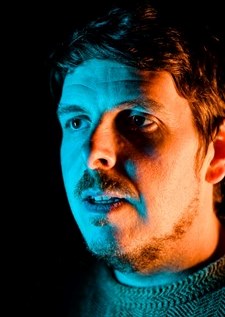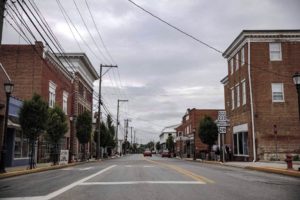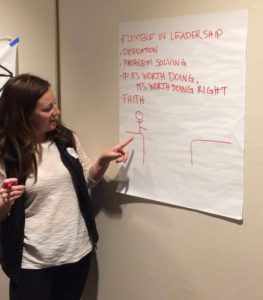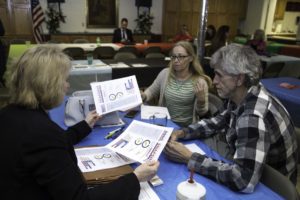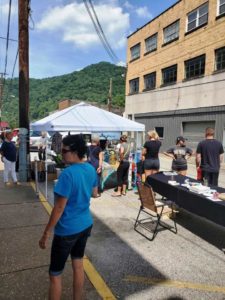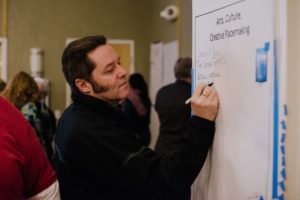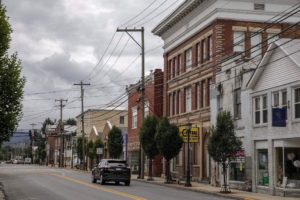This Guest Article for REVITALIZATION was written by Dan Taylor.
It was the winter of 2016. I was living in California at the time, watching from afar as a slate of bankruptcies hit the coal industry in West Virginia, where I had previously lived and worked after being a student at Marshall University in Huntington, West Virginia.
Hit simultaneously by a desire to get back to the state, guilt from not being there, and a desire to DO SOMETHING, I began looking for jobs.
A friend shared with me a job listing from the West Virginia Community Development Hub, which I’d heard of. It was a position funded via the newly implemented POWER (Partnerships for Opportunity and Workforce and Economic Revitalization) initiative through the Appalachian Regional Commission, focused on community-based planning around economic diversification in southern West Virginia.I was excited, to say the least. Work that combined both my experience with community organizing and a solutions oriented, asset-based approach to community development! I spent three and a half years revitalizing communities for a living, which is about as good as it gets!
The Hub’s own story began 10 years ago.
The organization prioritizes community-driven planning and action, never going into a place with a preconceived notion of what community members should work towards. While we come armed with research, expertise and knowledge, to achieve real buy-in on the work, the community development and revitalization efforts must be driven by the goals of the communities themselves.
Our community coaching method is centered around the concept of accompaniment, which is a philosophy that views the promoter of community development and community teams as equal experts, each bringing essential components to shared work.
We do see the role of community coaching as critical, though, as a way to add essential capacity to community work. We also see our value in the role of connectors; to partners, resources, funding, knowledge, and other peer communities engaging in revitalization work.
In order for the system of community development practitioners in our state to make sustainable, long-term investments in communities, this capacity building and leadership development must be in place and thriving.
Last year alone, The Hub directly coached 15 communities through various programs and initiatives. Tom Hart, one of our community leaders from Grafton, West Virginia, had this to say about his experiences with The Hub:
“Early in 2014 I was introduced to The Hub through a program my community was selected to participate in. Skeptical at first, I quickly became a believer in the intention and methods of The Hub’s staff. Since then, myself and my community have continued to greatly benefit through our continuing participation in several programs offered by the organization. Our relationships with The Hub staff and those around the state and region have made it possible for us to increase individual and group capacities directed toward improving the quality of life in our community.”
Community coaching and capacity building is just one pillar of The Hub’s work. Our approach also includes support for the state’s system of community development practitioners and related sectors. Examples of this work include The Hub’s early coordination around local food and agriculture and aligning support for dealing with the state’s abandoned and dilapidated buildings.
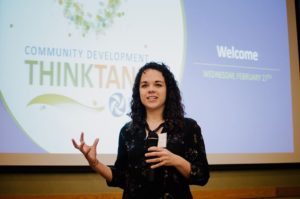
Hub Executive Director, Stephanie Tyree, speaking at the Community Development Think Tank in February of 2019.
Our third pillar is community-based policy. An exemplary program within this pillar is The Hub’s Next Generation Communities program, in partnership with Generation West Virginia. This program supports local policy change across the state for communities who are ready to take on the challenge of creating stronger communities with the goal of attracting and retaining young people.
Participants build relationships among community members and local decision-makers, forming teams that will help to drive this local policy change. These teams receive support as they review up-to-date research on what community characteristics prompt young people to live and work in a place, identify community goals, and implement strategies for local policy action.
The final pillar of The Hub’s work focuses on strategic community development communications. How do we tell the story about the revitalization successes of communities in West Virginia? How do we change the narrative of our state to include this positive perspective?
As part of this, The Hub maintains a blog of news stories from across the state that share these successes. We also recently launched the #NewStoryWV campaign, a way for West Virginians to lift up narrative-shifting stories about positive work and actions happening on the ground in our state. This campaign will help bring attention to this type of work not only from fellow West Virginians, but also from professional storytellers like members of the media.
Also this year, as part of our anniversary, we put out a call for project ideas to celebrate community development successes paired with an offer for a small amount of funding to help support carrying out the most promising projects.
Offering small grants to spark momentum around community-led and driven projects has become a key strategy that we use in supporting community development work. This July, we awarded eight $500 micro-grants to past communities that we have worked with for these celebration projects.
The projects include everything from supporting the creation of online content to promote attractions and businesses in communities, creating materials to honor local artists who’ve led mural projects, developing heritage trails to support local crafts people, and organizing a buy local pledge party to kick off a small business campaign, and more.
One local community team leader, Kandi Workman, plans to transform a road in Lincoln County, West Virginia into a heritage trail where local craftspeople who are often overlooked can present their work to the community. While working with The Hub over the past few years, Workman has sought out ways to help local business owners and build up the local economy without relying on large corporations that so many locals relied on for work for years.
“As we navigate living in an economically distressed area, we have to learn how to live, behave, interact, and thrive in ways that are unfamiliar to us,” said Kandi.
Now, both Boone and Lincoln Counties, where Kandi lives and works, are turning to entrepreneurship through The Hub’s Energizing Entrepreneurial Communities program to rebuild the economy. In this program, we help local restaurant owners, artists, health care providers, and more stick to projects that will make their communities more liveable and attract new residents.
“We have to create a new identity. It is hard to become someone else, it’s even harder for a region to do this. . . . For many of us, The Hub has helped us change our minds, and it was done in a way that made us the leaders and determiners of what our community’s future will look like,” added Kandi.
And for the next 10 years? The Hub continues to grow its statewide reach, to better work with and serve new communities across West Virginia.
We hope to grow the community development network in our state and ramp up support and coordination for those helping West Virginia communities with revitalization work. We look forward to seeing what the next 10 years holds for us and for the communities here.
Learn more about The Hub’s work on our website.
Unless otherwise credited, all photos are courtesy of WV Hub / Dan Taylor.
About the Author:
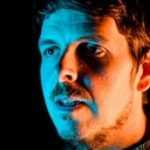 Dan Taylor was the Energizing Entrepreneurial Communities Program Coordinator at the WV Community Development Hub for over three years.
Dan Taylor was the Energizing Entrepreneurial Communities Program Coordinator at the WV Community Development Hub for over three years.
He grew up in Ashland, Kentucky and graduated from Marshall University in Huntington.
While in Huntington, Dan got his start in community development as a board member for Create Huntington. He ended up back in West Virginia in 2016 after working for nonprofits in New York and California.

